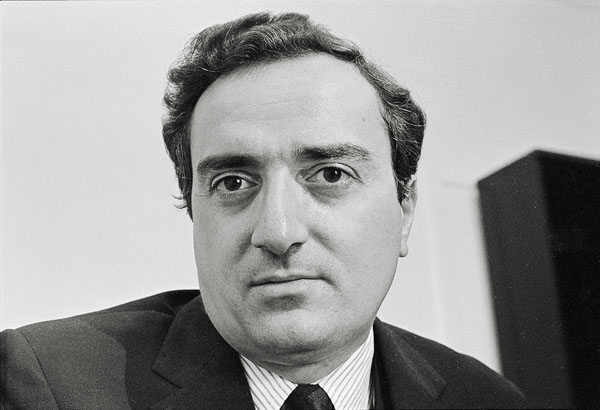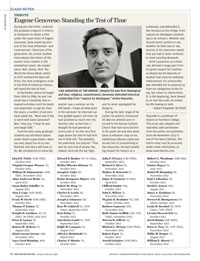In Memoriam
 ‘LIKE HORATIUS AT THE BRIDGE’: Despite his own firm ideological and later, religious, commitments, Genovese defended historical scholarship from “capture by ideologues,” writes Paquette. (Photo: Adam Fenster)
‘LIKE HORATIUS AT THE BRIDGE’: Despite his own firm ideological and later, religious, commitments, Genovese defended historical scholarship from “capture by ideologues,” writes Paquette. (Photo: Adam Fenster)During the mid-1970s, I entered the graduate program in history at Rochester to obtain a PhD under the supervision of Eugene Genovese. Gene would become one of the most influential—and controversial—historians of his generation. No scholar studied more deeply the history of the master-slave relation in the antebellum South. His masterpiece, Roll, Jordan, Roll: The World the Slaves Made, which in 1975 received the Bancroft Prize, the most prestigious prize in the field of American history, will stand the test of time.
At Rochester, where he taught from 1969 to 1986, he and I entered into a friendship that remained unbroken until his death last September at age 82. Over the years, a number of persons have asked me, “What was it like to work with Gene Genovese? Boy,” they say, “I hear he was one tough SOB.”
Truth be told, many graduate students started dissertations under Gene’s supervision; I dare say only about five of us ever finished. One story will have to do. My introduction to Gene the teacher was a seminar on the Old South. I forget at what point in the semester he returned our first graded papers. On mine, he had splashed so much red—his favorite color at the time—I thought he had opened an artery over it. On the very first page above the title he had written in bold red: “Too pedantic, too polemical, too passive.” That was his only line of praise. Yes, indeed, Gene set the bar high, and he never apologized for doing so.
During the later stage of his career, he publicly renounced his Marxist atheism and returned to the Roman Catholic Church that had nurtured him in his youth. No one who knew Gene at whatever stop on his intellectual odyssey could ever accuse him of proselytizing in the classroom. He had unyielding respect for history as a profession, and defended it, like Horatius at the bridge, from capture by ideologues pretending to be scholars. Whether you shared Gene’s politics or not, whether he liked you or not, success in his classroom meant that you had to labor tirelessly to meet exacting demands.
Gene’s greatness as a historian derived in large part from his great respect for tradition as deeply buried deposits of wisdom that must be endlessly rediscovered. His scholarship was intended not to separate us from our obligations to the living, but rather to inform them. If, in the beginning, Gene bowed to no God but truth, he ended his life bowing to both.
—Robert Paquette ’82 (PhD)
Paquette is a professor of history at Hamilton College. This essay was adapted and reprinted, with permission from the author and publisher, from the November 2012 issue of The New Criterion. The entire essay may be accessed, under some restrictions, at www.newcriterion.com.

